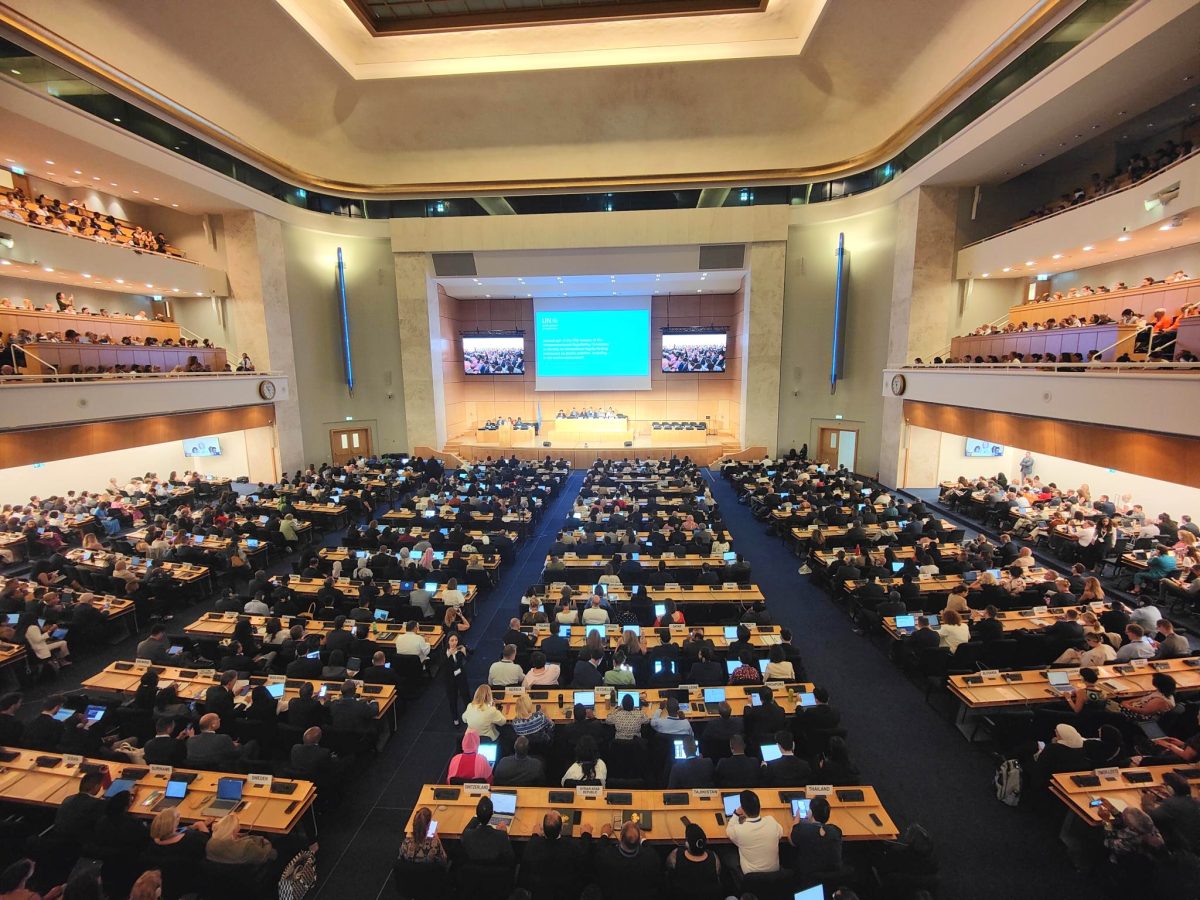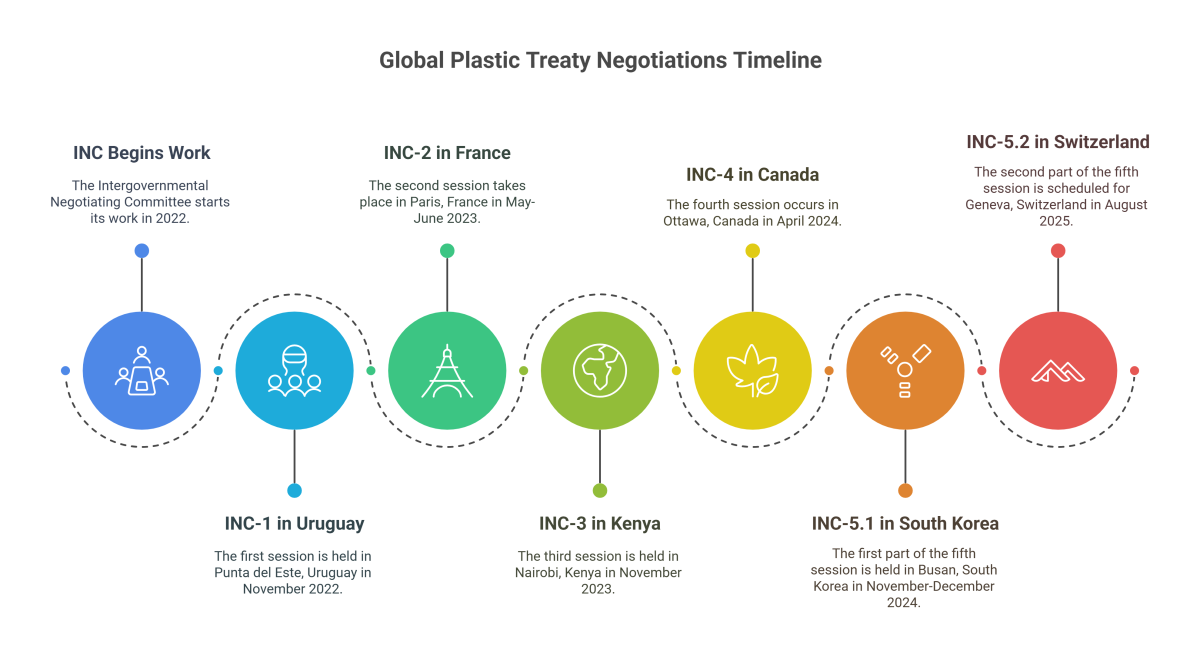Imagine a village gathered around their communal water tank, which is leaking badly, wasting precious water and causing shortages that affect crops, health, and daily life. Most of the villagers want to cap the inflow and replace the faulty sections entirely to stop the waste at its source, but a few, while agreeing that something needs to be done, have reservations about the upfront costs or disruptions to their water access. There are two ways to decide: vote and let the majority rule, or make sure every voice is heard and a compromise is forged that works for all. In this scenario, however, local elders are involved; they must oversee the process to ensure fairness, compliance with community traditions, and protection of the village’s overall well-being.

This is a simplified version of what is unfolding in Geneva, where delegates are now entering the final, critical days of negotiations for a possible global plastics treaty. The resumed fifth session (INC-5.2) of the Intergovernmental Negotiating Committee on Plastic Pollution, under the United Nations Environment Programme (UNEP), is ongoing from August 5 to 14, 2025, following an inconclusive first part in Busan in late 2024. For the first five days, technical leads and stakeholders have bickered endlessly, jotting notes and crossing out ideas. But today (August 12), the environment ministers arrive to take charge, hoping to finalize the next course of action amid mounting urgency, with only two days left before the session’s close.

As of August 12, 2025, talks remain gridlocked, with finance discussions dominating the final stretch amid deep divisions. Reports so far indicate mounting frustration and slow progress, especially with more than 200 industry lobbyists present, outnumbering entire regional delegations and overshadowing voices of scientists and Indigenous representatives. Midway through, the chair has warned that negotiations are “well off track” with over 1,500 disputed points in the draft text.
Key issues at the negotiations and their current status are summarized below:
| Key Issue | Description | Current Status (as of August 12, 2025) |
| Plastic Production Caps/Reduction | Whether the treaty should include global targets to reduce virgin plastic production across the full lifecycle, or focus only on national measures and waste. | Deadlocked; Oil-producing nations (e.g., Saudi Arabia, Russia, Iran, Kuwait—like-minded group) and the US oppose mandatory cuts, fearing economic impacts on petrochemical industries. High-ambition coalition (e.g., EU, Pacific islands, Peru, Kenya) pushes for reductions to sustainable levels. No consensus; US proposes limiting scope to pollution management only. |
| Chemicals and Additives of Concern | Banning or regulating harmful chemicals in plastics (e.g., certain polymers, additives linked to health/environmental risks). | Disputed; Some countries (e.g., Azerbaijan) highlight economic concerns; others (e.g., EU, Panama) advocate for restrictions. Text under Articles 3 and 6 remains unresolved, with opposition to new concepts. |
| Finance and Capacity Building | Funding mechanisms for implementation, especially for developing countries, including technical assistance and technology transfer. | Some progress; Revised text on financial resources (Article 11) accepted as basis for further talks. Line-by-line negotiations ongoing for capacity building (Article 12). Developing nations (e.g., Alliance of Small Island States, Tajikistan) emphasize need for robust support, while wealthier nations debate funding sources. |
| Waste Management and Remediation | Measures for managing plastic waste, reducing releases/leakages, and addressing legacy pollution. | Ongoing; First round of textual negotiations completed on Articles 7-10. Informal discussions continue, with broad support but details disputed (e.g., national vs. global approaches). |
| Scope and Definitions | Defining “plastic pollution” and the treaty’s overall scope (e.g., full lifecycle vs. downstream waste only). | No agreed text; Like-minded group laments insufficient progress. Debates on exemptions (Article 4) and principles persist, with over 1,500 brackets in draft. |
| Health Provisions | Including protections for human health impacts from plastics (e.g., under Article 19). | Opposed by some (e.g., Iran, India) who argue it overlaps with WHO mandate; others (e.g., Kenya) push for inclusion. Informal talks ongoing. |
| Institutional Arrangements and Decision-Making | Setup of governing bodies (e.g., Conference of Parties, subsidiary bodies) and rules (consensus vs. majority voting). | Discussions opened; Dispute on consensus (favored by like-minded group) vs. voting (suggested by Ethiopia to avoid “hostage” situations). Preamble and procedural articles forwarded for legal review. |
In the coming days, with ministers including Kenya’s CS Deborah Mlongo Barasa, the EU’s Jessika Roswall, and Saudi Arabia’s Abdulrahman AlGwaiz now at the table, expectations are for intense bargaining. UNEP Executive Director Inger Andersen has urged a “strong, ambitious, and just” treaty, warning that recycling alone won’t suffice. Optimism persists for breakthroughs, but like past negotiations, failure looms of potentially yielding a weak agreement or none at all.
Will the village unite to mend the tank, or watch it drain away?
Opinion by Nahashon M. Nahashon is the Communication Lead at Kenya Plastic Pact Secretariat. Email: communication@kpp.or.ke
